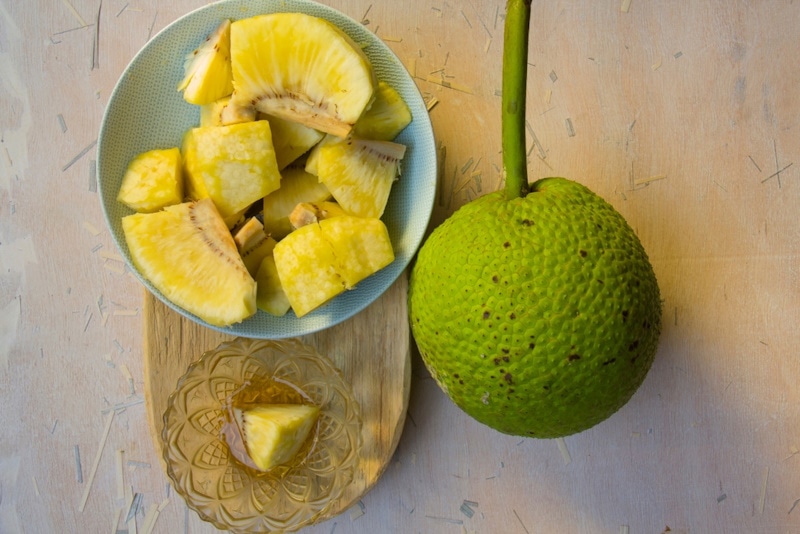Breadfruit is a nutritious fruit with many health benefits for humans, but what about dogs? While breadfruit is not toxic to dogs, it can cause digestive issues if consumed in large quantities. In this article, we will explore the pros and cons of feeding breadfruit to dogs and provide some healthy alternatives for treating your canine companion.
What Is Breadfruit?
Breadfruit, scientifically known as Artocarpus altilis, is a tropical fruit native to regions such as New Guinea, the Philippines, and the Maluku Islands. The fruit is characterized by its green, bumpy rind, which turns smoother and yellower as it ripens. The flesh of the fruit, resembling the flavor of a potato, can be consumed in various stages of ripeness. Breadfruit trees can grow up to 85 feet tall and are valued for their large, beautiful leaves and lightweight, termite-resistant wood.
Health Concerns of Feeding Breadfruit to Dogs
While breadfruit contains healthy nutrients like fiber, protein, vitamins, and minerals, it can pose some health risks for dogs. Here are a few concerns to consider:
Digestibility
Dogs have digestive tracts that are primarily designed for a meat-based diet. Introducing high-fiber foods like breadfruit can cause gastrointestinal distress, including bloating and diarrhea, as it can be difficult for their digestive system to break down fibrous products.
Potential Irritants
Breadfruit contains oxalates and oxalate crystals, which can irritate the digestive tract, including the mouth and throat. This irritation may lead to drooling, swelling, difficulty swallowing, and pain. Consuming large amounts of breadfruit over time can contribute to the formation of bladder and kidney stones.
Sugars
Breadfruit contains natural sugars, and consuming them in high amounts can cause digestive upset in dogs. This may manifest as vomiting, diarrhea, and stomach pain. In the long term, excessive sugar consumption can contribute to weight gain and diabetes in dogs.
Allergies
Just like humans, dogs can be intolerant or allergic to certain foods. When introducing something new to their diet, there is always a risk of a reaction. If your dog eats breadfruit and experiences symptoms such as vomiting, diarrhea, or skin itching, discontinue feeding them breadfruit and consult a vet.
Are There Any Benefits to Giving Breadfruit to Dogs?
Although breadfruit has nutritional benefits, the potential risks associated with feeding it to dogs outweigh the benefits. With its digestive irritants and potential gastrointestinal issues, it’s best to choose alternative treat options for your furry friend.
Healthy Alternatives to Breadfruit
If you’re looking for healthy and safe treats for your dog, consider these alternatives:
Apples: Apples are a good source of fiber and vitamins. Remember to remove the seeds and core and slice them into small pieces before serving.
Carrots: Carrots are low in calories, crunching treats that promote dental health. Ensure they are well-cleaned and cut into small pieces before serving. You can also cook them lightly without losing many nutrients.
Sweet Potatoes: Cooked and unseasoned sweet potatoes provide vitamins, fiber, and natural sweetness, making them a healthy and tasty treat for your dog.
Watermelon: Remove the seeds and rind, and offer small pieces of watermelon as hydrating treats. Many dogs enjoy the refreshing taste, especially during the warmer summer months.
Cooked Lean Meats: A small amount of cooked lean meat, such as chicken or turkey, can be a healthy and protein-rich treat that boosts energy and promotes muscle development.
Frequently Asked Questions
Can Dogs Eat Breadfruit?
Breadfruit is not a recommended food for dogs. While a small piece of properly cooked breadfruit might not be immediately harmful, its high fiber content and potential digestive concerns make it less suitable for dogs than many other options.
Is Breadfruit Toxic to Dogs?
Breadfruit itself is not considered toxic to dogs, but it contains compounds that might be harmful in large quantities. Feeding small quantities infrequently can help reduce potential risks.
What Should I Do If My Dog Accidentally Ate Breadfruit?
If your dog accidentally consumes a small piece of cooked breadfruit, monitor them for any signs of digestive upset, such as vomiting or diarrhea. If the symptoms are severe or persist for more than a day, contact your veterinarian.
How Do I Know What Foods Are Safe for My Dog to Eat?
It’s important to consult your veterinarian before introducing a new food into your dog’s diet. They can provide advice based on your pet’s specific health conditions and needs.
Conclusion
While breadfruit is not toxic to dogs, it is not a preferred food for them. The high fiber and sugars in breadfruit can be difficult for dogs to digest, leading to bloating and other digestive issues. Additionally, the presence of oxalates and other digestive irritants can potentially cause long-term effects, such as bladder stones. Opt for healthier treat options like apples, carrots, sweet potatoes, and watermelon for your furry friend. If your dog accidentally ate breadfruit, they will likely be fine but might experience some digestive discomfort. Contact a vet immediately if you observe severe vomiting or diarrhea or difficulty swallowing.
To learn more about caring for your canine companion, visit Pawsoha.

